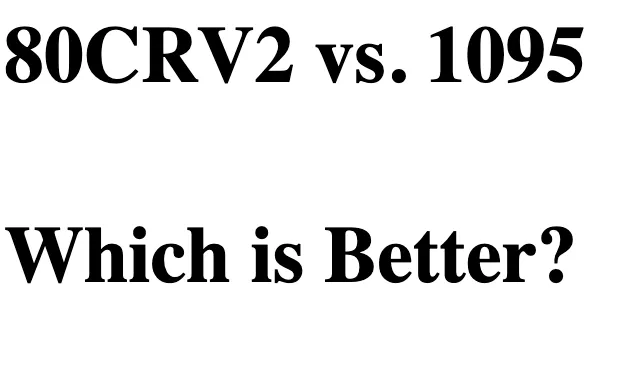When it comes to selecting the perfect blade steel for knives, the choices can be overwhelming. Among the myriad options available, 80CRV2 and 1095 are two popular contenders.
In this blog post, we will dissect the differences between 80CRV2 and 1095 steel, shedding light on their individual strengths and weaknesses. By exploring their composition, hardness, wear resistance, edge retention, and corrosion resistance.

Composition and Basics
80CRV2 steel is a high-carbon tool steel known for its excellent balance of hardness and toughness. It contains 0.8% carbon, 0.5% chromium, 0.4% manganese, 0.2% vanadium, and 0.25% silicon.
On the other hand, 1095 is also a high-carbon steel but lacks the chromium content found in 80CRV2. It consists of 0.9% carbon, 0.3% manganese, 0.04% phosphorus, 0.035% sulfur, and 0.15% silicon.
| Chemical Element | 80CrV2 Steel | 1095 Steel |
|---|---|---|
| Carbon (C) | 0.75%-0.85% | 0.90%-1.03% |
| Chromium (Cr) | 0.40%-0.60% | – |
| Vanadium (V) | 0.15%-0.25% | – |
| Manganese (Mn) | 0.40%-0.60% | 0.30%-0.60% |
| Silicon (Si) | 0.15%-0.30% | 0.15%-0.35% |
| Phosphorus (P) | 0.025% max | 0.025% max |
| Sulfur (S) | 0.025% max | 0.035% max |
| Molybdenum (Mo) | – | – |
| Nickel (Ni) | – | – |
| Carbon Equivalent | – | – |
| Hardness (HRC) | 58-60 | 58-60 |
| Corrosion Resistance | Moderate | Low |
| Wear Resistance | High | High |
| Toughness | Good | Good |
Hardness and Wear Resistance
In terms of hardness, 80CRV2 steel boasts a Rockwell hardness of 57-58, slightly surpassing the 55-57 range of 1095 steel. This gives 80CRV2 a slight edge in terms of hardness. Additionally, 80CRV2 exhibits superior wear resistance compared to 1095 steel.
Its wear-resistant properties enable it to withstand chipping and breaking better than 1095 steel, making it a preferred choice for heavy-duty applications.
Edge Retention and Sharpening
When it comes to edge retention, 1095 steel outshines 80CRV2. It has the ability to maintain its sharpness for longer periods compared to 80CRV2.
However, there’s a trade-off. While 1095 offers better edge retention, it is also more challenging to sharpen. On the other hand, 80CRV2 steel is relatively easier to sharpen, making it a favorable option for those who prioritize ease of maintenance.
Corrosion Resistance
Both 80CRV2 and 1095 steel exhibit poor corrosion resistance. However, 1095 steel performs slightly better in this aspect, offering slightly more resistance to rust and tarnishing compared to 80CRV2.
It is worth noting that proper care and maintenance, such as regular cleaning and oiling, are essential for preventing corrosion in both steels.
Conclusion
In the battle of 80CRV2 vs. 1095 steel, the choice ultimately depends on the specific needs and preferences of the user. 80CRV2 steel shines with its balanced hardness, superior wear resistance, and ease of sharpening.
It is an excellent choice for those seeking a versatile steel that can withstand demanding tasks. On the other hand, 1095 steel excels in edge retention, making it ideal for applications that require prolonged sharpness. However, it may pose a greater challenge when it comes to sharpening.
